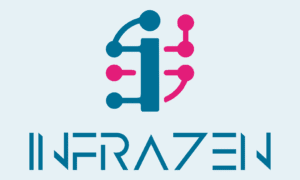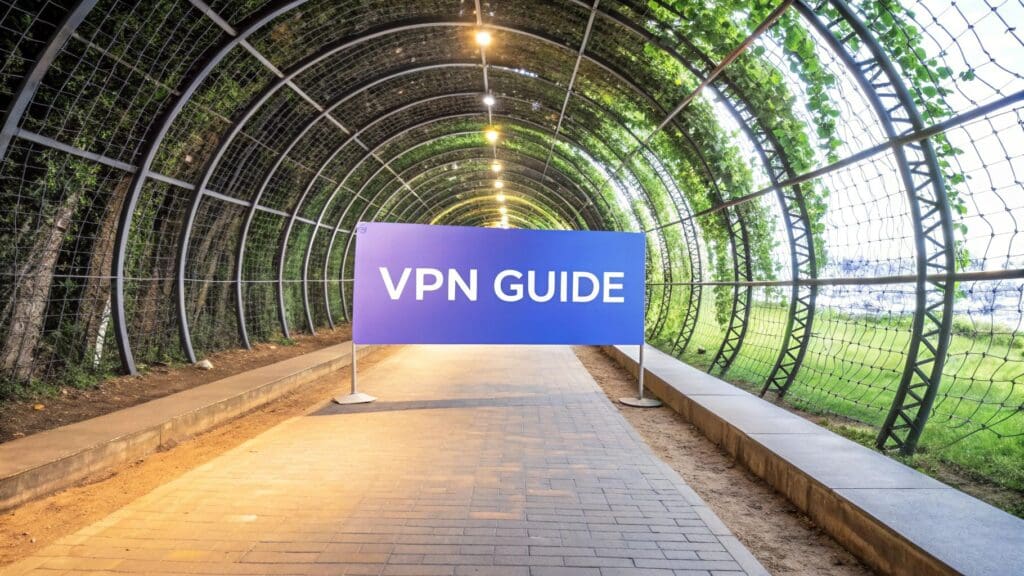So, what exactly is a VPN?
The term stands for Virtual Private Network, and at its core, it creates a secure, encrypted connection between your device and the internet. Think of it as a private, digital tunnel that shields everything you do online from prying eyes.
This means your browsing, file transfers, and communications are kept exactly as they should be: private and secure.
Understanding a Virtual Private Network
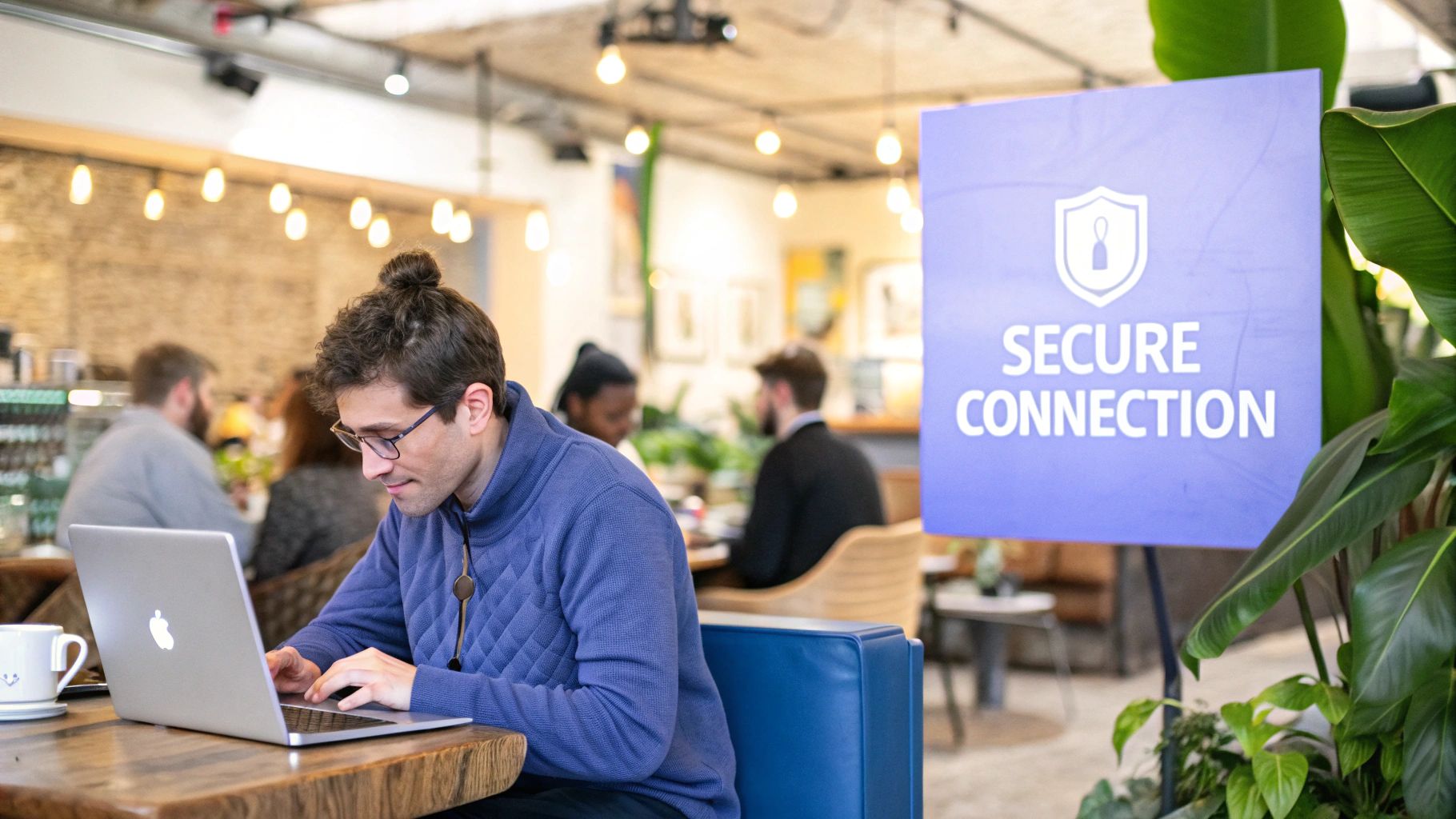
Let's use an analogy. Your normal internet connection is a bit like sending a postcard. Anyone who handles it on its journey-from the postal worker to your recipient-can easily read the message you've written. It's public, open, and not very secure at all.
A VPN changes the game completely.
Instead of a postcard, a VPN seals your data inside a locked, armoured safe. This safe is then dispatched via a private courier to a secure sorting facility-the VPN server-before it reaches its final online destination. No one can peek inside the safe, so its contents remain completely confidential.
This "armoured safe" is what we call an encrypted tunnel. It’s the very heart of what a VPN does. By funnelling your internet traffic through this private tunnel, a VPN performs two crucial functions:
- It Secures Your Data: All the information you send and receive is scrambled, making it unreadable to your internet service provider (ISP), advertisers, or anyone else trying to snoop on your activity.
- It Hides Your Identity: A VPN masks your real IP address-your device's unique online identifier-and swaps it with the IP address of the VPN server. This makes it look like you're browsing from an entirely different location.
To put it simply, a VPN connection has three core parts working together to keep you safe.
Core Components of a VPN Connection
| Component | Role and Function |
|---|---|
| VPN Client | The software on your device (computer, phone) that initiates the secure connection. |
| Encrypted Tunnel | The secure, private pathway created between your device and the VPN server. All your data travels through here. |
| VPN Server | The secure, remote computer you connect to. It hides your real IP address and securely forwards your traffic to the internet. |
These components create a powerful shield for your online life, whether you're at home, in the office, or working from a local coffee shop.
Why This Matters for Creative Agencies
This isn't just a tool for tech geeks; it's rapidly becoming an essential piece of everyday security. The demand for VPNs is skyrocketing, especially here in the UK. Fuelled by the rise of remote working and increasing cyber threats, the UK's VPN market is projected to hit around USD 6.37 billion by 2027.
This shows a massive shift towards better data protection for businesses and individuals alike. You can discover more about the UK's growing VPN market and what's driving it.
A VPN is your first line of defence in protecting your online privacy. It carves out a secure, private space for your online activities, whether you're working on the go or connecting to your office network from home.
By setting up this secure connection, a VPN ensures that all your sensitive information-think client project files, financial details, or personal data-remains completely protected. It’s a simple but incredibly powerful tool for maintaining privacy and security in our constantly connected world.
The Journey of Your Data Through a VPN Tunnel
To really get what a virtual private network does for you, it helps to imagine the journey your data takes from your device out to the wider internet. It’s this process of encryption and tunnelling that turns a public connection into a private, secure channel. And it all kicks off the moment you hit "connect."
First, the VPN client-that's the app on your laptop or phone-jumps into action. Before a single bit of information leaves your device, the client encrypts it. Think of this as scrambling your data into an unreadable code, making it completely useless to anyone who might try and peek at it, like your internet service provider or snoops on a public Wi-Fi network.
This first step is the bedrock of your online privacy. To truly grasp the level of security a VPN offers, it's worth understanding the different encryption methods available. These complex protocols are the mathematical keys that lock and unlock your digital safe.
The Secure Tunnelling Process
Once your data is all scrambled up, it's ready for its trip. The VPN client establishes a secure, private connection to a remote VPN server somewhere else in the world. This connection is what we call a VPN tunnel, and it acts as a protected superhighway for your encrypted data packets.
This is a great way to visualise your data zipping securely through that encrypted tunnel.
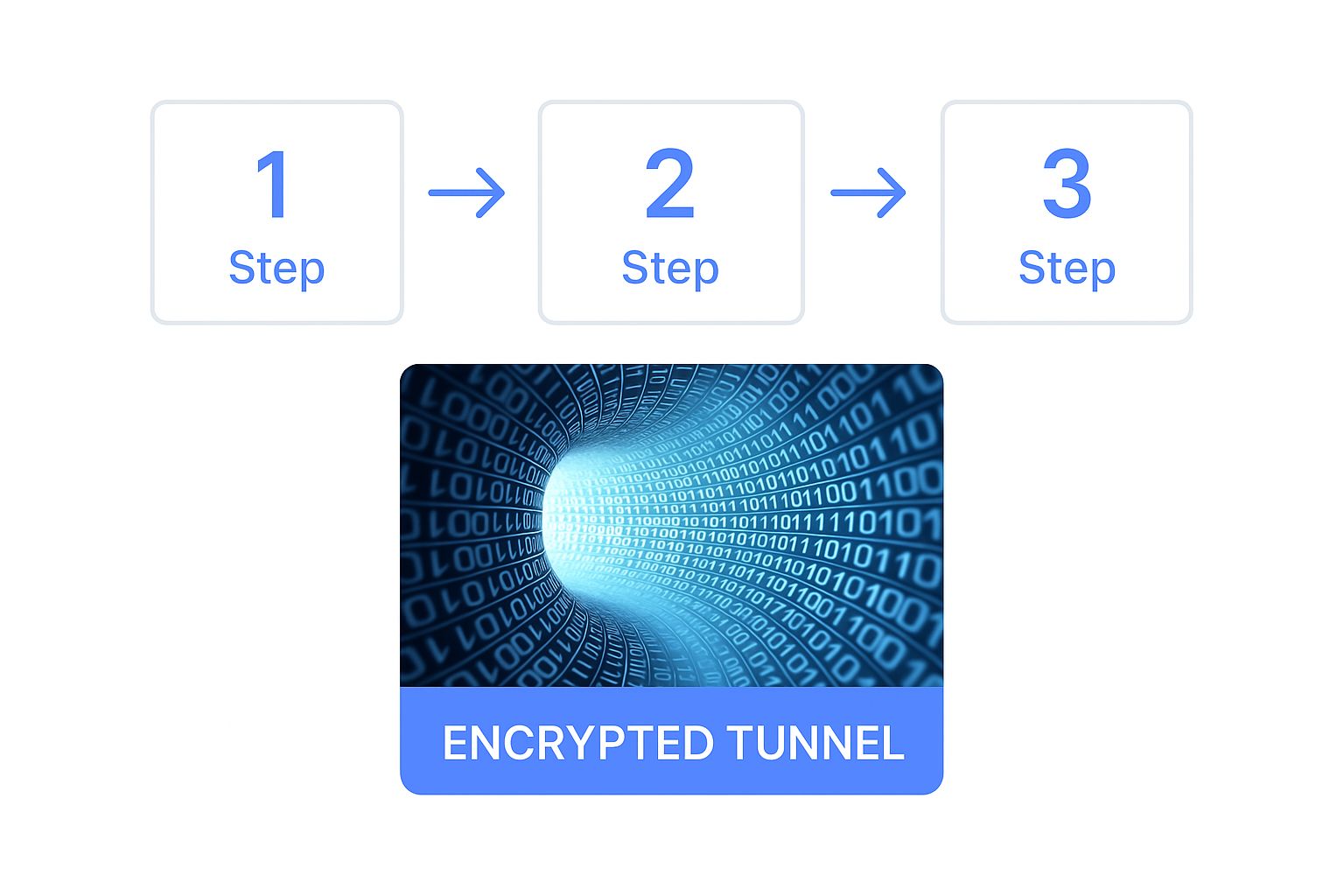
As you can see, the tunnel walls off your data from the open internet, ensuring it travels from your device to the VPN server without being exposed. Instead of being out in the open, your traffic is neatly contained within this secure link, completely hidden from prying eyes.
Key Takeaway: A VPN tunnel doesn't just encrypt your data-it encapsulates it. It's a bit like putting a sealed, addressed envelope inside another, unmarked security envelope. This outer layer hides not just the contents but also the final destination from your local network.
Arriving at the Destination
When your encrypted data packet reaches the VPN server, the final part of the magic happens. The server, which holds the correct decryption key, reverses the scrambling process. It carefully unscrambles your data, putting it back into its original, readable format.
Now, here’s the really clever bit that seals your anonymity.
The VPN server sends your request on to its final destination-the website, app, or online service you wanted to access. But crucially, it does this using its own IP address, not yours.
This has two huge benefits:
- Your Real Identity Is Hidden: The website you visit only sees the VPN server's IP address and location, not your own. Your personal online footprint is effectively wiped clean.
- Your ISP Is Kept in the Dark: Your internet provider can tell you're connected to a VPN server, but it has no idea what you're doing online or which websites you're visiting.
This entire sequence-encrypt, tunnel, decrypt, and forward-happens in the blink of an eye. The end result is a seamless browsing experience where your online activities stay private, your location is masked, and your data is secure from start to finish.
The Real-World Wins of Using a VPN
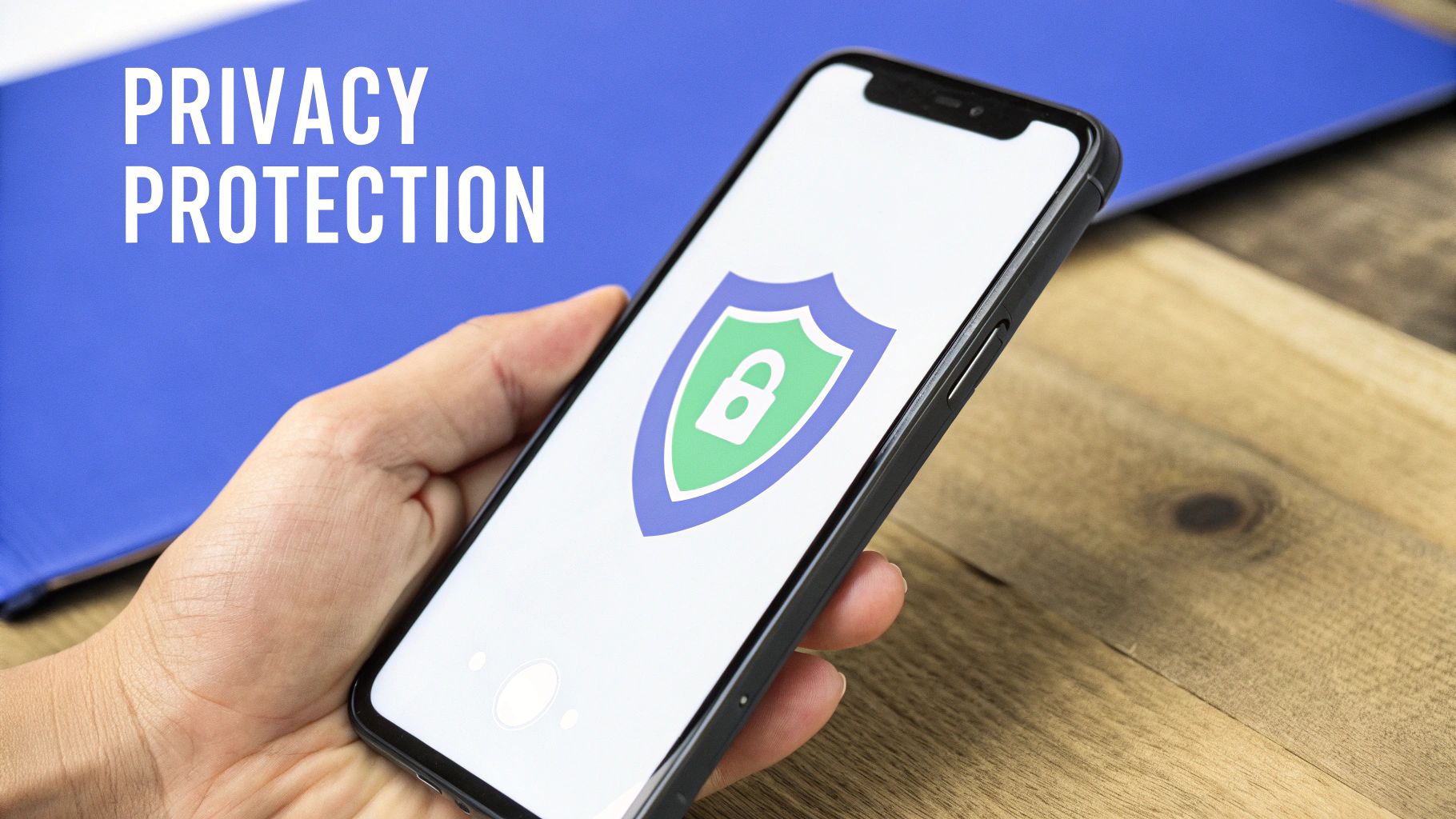
Knowing the technical details of a virtual private network is one thing, but the real value comes from its day-to-day, practical uses. A VPN brings tangible advantages that boost your security, privacy, and online freedom, whether you’re working solo or running an agency.
One of the most immediate benefits is securing your connection on public Wi-Fi. When you connect to the internet at a café, airport, or hotel, you're sharing that network with complete strangers. This makes it alarmingly easy for someone with malicious intent to snoop on your activity and grab sensitive data like passwords or financial details.
A VPN wraps all your traffic in a layer of strong encryption, essentially turning that wide-open public network into your own private, secure tunnel. This means you can work, browse, or shop with confidence, knowing your information is shielded from prying eyes. For anyone who works on the move, this isn’t a luxury-it’s an essential security measure and a foundational step in learning how to prevent cyber attacks that prey on insecure networks.
Unlock Global Content and Services
Another major plus is the ability to sidestep geographical restrictions. Lots of streaming services and websites serve different content depending on your location. A user in the UK, for instance, might not be able to access the same library of films or TV shows available to someone in the United States.
By connecting to a VPN server in another country, you can make it appear as though you’re browsing from that location. This simple switch unlocks a world of international content, giving you access to the shows, sports, and news you want, no matter where you physically are.
A VPN gives you the digital key to a truly global internet. It dissolves artificial borders, providing you with the freedom to explore online content without being limited by your physical location.
Enable Secure Business Operations
For businesses, and especially for creative agencies with remote or hybrid teams, a VPN is practically indispensable. It provides a secure and reliable way for employees to connect to the company's internal network from any location.
This has several mission-critical applications:
- Protecting Sensitive Data: Team members can access confidential client files, project plans, and internal communications without risking exposure on an unsecured home network.
- Ensuring Compliance: For regulations like GDPR, keeping data protected is non-negotiable. A VPN helps ensure that all data transmissions are encrypted and secure, which is a massive help for your compliance efforts.
- Seamless Remote Work: For professionals and remote workers, understanding how a VPN facilitates secure remote access is a critical benefit for both productivity and security.
This growing reliance is clearly reflected in market trends. The UK VPN market is forecast to reach a staggering USD 13.4 billion by 2033, expanding at a compound annual growth rate of 16.11%. Highlighting this boom, UK-based Kape Technologies acquired ExpressVPN for USD 936 million in 2021, instantly doubling its user base to 6 million. You can learn more about these findings on the UK's VPN market growth.
How to Choose the Right VPN Service
With so many providers out there, all shouting about how they’re the best, picking a VPN can feel like an impossible task. But it's actually pretty straightforward once you know what to look for. If you focus on a few critical areas, you can cut through the marketing noise and find a service that genuinely protects you.
The very first thing to check is the provider’s security protocols. These are the technologies that build the encrypted tunnel for your data. Look for services offering modern, solid options like OpenVPN and WireGuard. OpenVPN is the long-time industry standard, known for being incredibly reliable and secure, while WireGuard is the newer kid on the block, famous for its blistering speed and clean, simple code.
Just as crucial is the provider's logging policy. A genuine no-logs policy is completely non-negotiable if you’re serious about privacy. This is a promise from the provider that they won’t collect, store, or share any information about your online activity, like your IP address or what sites you visit.
A VPN’s entire job is to protect your privacy. If the provider is keeping notes on what you do online, it defeats the whole purpose. Always go for a service that has had its no-logs claim proven by an independent, third-party audit. That’s how you get real peace of mind.
Key Features to Compare
Beyond the security basics, a few other features will have a big impact on your day-to-day experience. Keep these in mind as you narrow down the contenders:
- Server Network: A big, geographically spread-out server network gives you more options for getting around geo-blocks and finding a fast server that isn’t overloaded. More servers in more countries means better performance and more freedom.
- Connection Speed: All VPNs will slow your connection a little bit-that's just the cost of encryption. But the best services minimise this, so you can still stream, game, or download large files without frustrating lag. Look for providers known for their high-speed connections.
- Simultaneous Connections: Most paid VPNs let you connect several devices on a single subscription. Check the provider’s limit to make sure it covers all your gear, from laptops and smartphones to tablets.
Making these choices is a lot like figuring out how to choose the right MSP for your company’s IT. It’s about matching the technology to your actual business needs.
Free vs Paid VPNs A Head-to-Head Comparison
The idea of a free VPN is tempting, but it almost always comes with major trade-offs that undermine the very reason you wanted a VPN in the first place. This table breaks down the key differences so you can make a safe, informed choice.
| Feature | Free VPN Services | Paid VPN Services |
|---|---|---|
| Business Model | Sells user data, shows ads, or uses a freemium model. | Funded by user subscriptions. |
| Security & Privacy | Often weak encryption and may log your activity. | Strong encryption, strict no-logs policies (often audited). |
| Performance | Slow speeds, limited servers, and frequent data caps. | High-speed servers, global network, and no data limits. |
| Features | Basic functionality, few extra features. | Advanced features like kill switches and split tunnelling. |
| Support | Limited or non-existent customer support. | 24/7 customer support via live chat, email, and phone. |
When it comes down to it, paid VPNs are funded by their users, which means they can afford to invest in top-tier security, a huge global server network, and responsive customer support. Free services need to make money somehow, and that often means selling your data to advertisers, capping your usage, or flooding you with ads.
Put simply, with a free VPN, you often become the product. For reliable security you can actually count on, a reputable paid service is always the way to go.
Why Mobile VPN Security Is More Important Than Ever
Our smartphones and tablets are with us everywhere, holding everything from personal chats to sensitive work files. This constant connection makes them a goldmine for anyone looking to snoop on your data, especially as we jump between different networks all day.
Everyday places like coffee shops, airports, and hotels become potential security minefields. The risks of using public or untrusted Wi-Fi are real.
This is precisely where a VPN becomes an essential tool for your mobile devices. When you switch on a VPN on your phone, it wraps all your mobile data-from apps, browsers, and emails-in that same encrypted tunnel we talked about earlier. It's the single best way to shield your information from prying eyes on shared networks, ensuring your activity stays private.
The Mobile-First Security Mindset
The move to mobile isn't just a trend; it’s a fundamental shift in how we live and work online. And the data on VPN usage reflects this reality.
By 2025, it's projected that around 69% of VPN users worldwide will connect through a mobile device. This makes perfect sense when you consider that smartphones now drive over 60% of all global internet traffic. The scale of this mobile movement is massive.
This shift towards mobile-first security shows a growing awareness of the unique vulnerabilities these devices have. A VPN on your phone is no longer a niche tool for tech enthusiasts-it’s becoming a mainstream necessity for everyday online safety.
A mobile VPN isn't just about security. It's about regaining control over your personal data in a world where you're always connected. It transforms your smartphone from a point of vulnerability into a secure personal hub.
Supporting the Modern Remote Worker
The explosion of remote and hybrid work has cemented the need for mobile VPNs. Professionals are no longer chained to their desks; they’re working from client sites, on the train, or while waiting for a flight. This flexibility demands a new, more agile level of security.
For creative agencies, this is especially critical. Imagine a team member needing to review a confidential client design or pull files from a project server while on the move. Without a VPN, that sensitive company data is wide open on whatever network they’re using.
A mobile VPN creates a secure, encrypted link back to the company network, keeping data safe no matter where your team is. It's a vital piece of any robust strategy for cybersecurity for remote workers.
To effectively combat these evolving threats, it's also important to understand the role of dedicated cybersecurity professionals. Ultimately, a mobile VPN is an indispensable tool for the modern professional, providing the security needed to work productively and safely in our highly connected, mobile-first world.
Still Got Questions About VPNs?
Even after getting your head around what a virtual private network is, you might still have a few things you're not sure about. That's completely normal. This final section tackles some of the most common queries we hear, with clear, straightforward answers to help you feel confident about putting a VPN to work.
Is Using a VPN Legal in the United Kingdom?
Yes, using a VPN is completely legal in the UK. Individuals and businesses are free to use them for perfectly legitimate reasons, like tightening up privacy and securing data. Think of it as a standard tool for protecting your online activity.
However, it's crucial to remember one key distinction: a VPN gives you privacy, not a free pass. Any online activity that is illegal without a VPN remains just as illegal when you're using one. Its main job-to shield your data and identity-is a perfectly legal and responsible goal.
Will a VPN Grind My Internet to a Halt?
It's true that a VPN can sometimes cause a minor dip in internet speed. This happens because your data takes an extra step on its journey-it travels to the VPN server to be encrypted before heading to its final destination. That extra security checkpoint can add a tiny delay.
But with most premium VPN services, this slowdown is often so small you won't even notice it for everyday tasks like streaming, browsing, or downloading files. In some situations, a VPN might even improve your connection speed. If your Internet Service Provider (ISP) is throttling-deliberately slowing down-certain types of traffic like video streams, a VPN can sneak past those restrictions by hiding your activity from them.
There's a common myth that a VPN will always slow your internet to a crawl. In reality, a quality VPN is engineered for speed, and the security it provides is well worth the minimal-if any-impact on performance.
Can I Use One VPN Account on Multiple Devices?
Absolutely. Most reputable, paid VPN providers allow you to connect several devices at the same time under a single subscription. It's a standard feature designed for the way we all work now, juggling multiple gadgets.
Typically, you can expect to connect anywhere from five to ten devices simultaneously, though some providers offer even more generous limits. This means you can protect your laptop, smartphone, tablet, and maybe even a smart TV all at once, without needing to pay for separate accounts. Before you commit, it's always a good idea to check the provider's specific device limit to make sure it fits your needs.
What Is a No-Logs Policy and Why Is It So Important?
A no-logs policy, sometimes called a "zero-logs" policy, is a VPN provider's promise that it does not track, collect, or store any records of what you do online. This is arguably the single most critical feature for anyone who truly values their privacy.
This policy covers sensitive information such as:
- Your browsing history (the websites you visit)
- The IP addresses you use
- Connection timestamps and how long you're online
- The amount of data you transfer
This matters because if a VPN provider has no data on you, they can't be forced to share it with government agencies or advertisers. What's more, if the provider ever suffers a security breach, there's no user data for hackers to steal. For real peace of mind, always choose providers that have had their no-logs claims independently audited by a respected third-party firm.
At InfraZen Ltd, we help creative agencies work securely and without interruption. If you're tired of worrying about IT and want to focus on your creative work, we can manage the technical side of things for you. Learn more about how InfraZen can support your agency.
